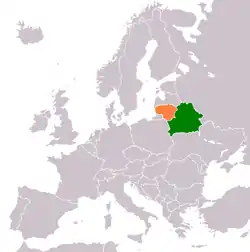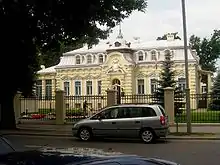Belarus–Lithuania relations
Belarus–Lithuania relations are foreign relations between Belarus and Lithuania. The countries established diplomatic relations on 24 October 1991, shortly after the dissolution of the Soviet Union. The two countries share 680 kilometres (420 mi) of common border. Vilnius hosts multiple Belarusian civil society organizations, such as European Humanities University, Belarusian refugees such as Sviatlana Tsikhanouskaya, remains of national heroes the two countries share like Konstanty Kalinowski and has been the birthplace of Belarusian literature (Francysk Skaryna).
 | |
Belarus |
Lithuania |
|---|---|
Lithuania's border with Belarus is the country's longest border. For Belarus it is its 3rd-longest border. Vilnius is the closest capital of an EU member state to Minsk. It is also the primary foreign shopping and air transit hub (via Vilnius and Kaunas airports) for Belarusians from Minsk and beyond.
History
The current territories of both countries were part of the Kingdom of Lithuania, Grand Duchy of Lithuania (and subsequently the Polish–Lithuanian Commonwealth), the Russian Empire, LitBel and, ultimately, the Soviet Union (into which Belarus was incorporated following World War I and Lithuania following World War II).
On 20 December 1991, the Supreme Council of Lithuania recognized the independence of Belarus, with the same happening vice versa seven days later. On 30 December 1992, an agreement on diplomatic relations was signed in Minsk.[1] The Belarus–Lithuania border is defined by a February 1995 treaty, with the ground demarcation of the border being completed in 2007.[2] Belarusian President Alexander Lukashenko made two official visits to Lithuania in 1995 and September 2009. On 27 October 2010, President Dalia Grybauskaite became the first ever Lithuanian head of state to the Belarusian capital of Minsk, as well as the second leader of an EU member nation to visit Belarus (Italian Prime Minister Silvio Berlusconi was the first).[3] In April 2020, Lithuanian President Gitanas Nausėda and Lukashenko had the first tête-à-tête conversation in 10 years.[4] In May 2019, former President and Member of the European Parliament Rolandas Paksas paid a visit to Belarus for the first time in an official capacity, discussing proposals to stabilize the military-political situation in the Baltic Sea.[5]
Rifts in relations
Each country hosts opposition figures for the other, with Belarus sheltering coup-leader Vladimir Uskhopchik and Lithuania harboring Belarusian opposition figures. Lithuania has attempted to encourage a European orientation in Belarusian leadership, and has pursued trade deals and cooperation among law enforcement agencies. Sharing of information led to the arrest of Belarusian human-rights activist Ales Bialiatski, resulting in European condemnation of both countries.[6] Following the Lukashenko government's crackdown after the disputed 2020 Belarus Presidential elections, which were widely regarded as unfree and unfair,[7] Belarusian opposition candidate Sviatlana Tsikhanouskaya fled to Lithuania.[8] On 12 August Lithuania opened its borders to all Belarusians for humanitarian purposes due to the crackdown on protests.[9] Two days later on August 14, Lithuania became the first EU state to openly reject the legitimacy of Alexander Lukashenko as the President of Belarus. Lithuanian President Gitanas Nausėda said "We can not call Mr. Lukashenko legitimate because there were no free democratic elections in Belarus".[10]
Resident diplomatic missions

External links
References
- Связи Литовской Республики с Республикой Беларусь
- "The World Factbook". Retrieved 1 September 2016.
- https://www.baltictimes.com/news/articles/27230/
- https://www.lrp.lt/en/media-center/news/33998
- "Минские переговоры – 2: как прошла встреча Паксаса и Лукашенко в Белоруссии". Baltnews (in Russian). 2019-05-02. Retrieved 2020-10-31.
- Eastern approaches (8 August 2011). "The snitches of Vilnius". The Economist. Retrieved 13 September 2013.
- Haboush, Joseph (2020-08-10). "Belarus elections deemed unfair by US, Germany and others; candidate missing". Al Arabiya English. Retrieved 2020-08-11.
- "Belarusian opposition leader Tikhanouskaya in Lithuania says FM". The Jerusalem Post | JPost.com. Retrieved 2020-08-11.
- "Lithuania allows unrestricted entry to Belarusians 'for humanitarian purposes'". www.baltictimes.com. Retrieved 2020-08-13.
- "Lithuanian Leader Says Lukashenko Lost Legitimacy As Belarusian President". UrduPoint. Retrieved 2020-08-14.
.svg.png.webp)